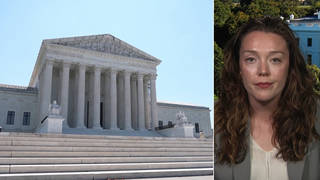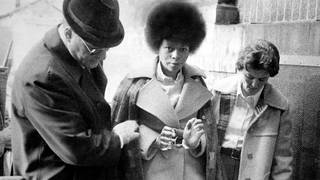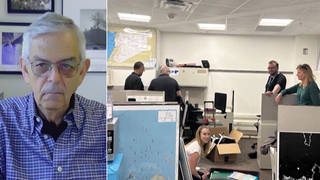
Topics
Guests
- Michael Ratnerpresident emeritus of the Center for Constitutional Rights in New York City and past president of the National Lawyers Guild.
There are no commemorations planned in Washington, D.C., but today marks the 50th anniversary of the U.S. embargo against Cuba — the longest-running embargo in the world. On February 7, 1962, President John F. Kennedy formally expanded the harsh regime of commercial and financial sanctions against Cuba that have continued to the present day. The embargo has been solidly bipartisan, notably intensifying under the Helms-Burton Act of 1996, which was passed by a Republican-controlled Congress and signed into law by President Bill Clinton, a Democrat. The United States has targeted Cuba in defiance of widespread international condemnation. “That’s been the longest-enduring embargo we have had in the world. And the question is, why is it still there? What good has it done? Of course, it has squeezed the Cuban people,” said Michael Ratner, president emeritus of the Center for Constitutional Rights, who has been involved in efforts to challenge the U.S. embargo against Cuba for many years. [includes rush transcript]
Transcript
AMY GOODMAN: We turn now from Syria to Cuba. On Monday, former Cuban President Fidel Castro was shown in his first public appearance since April. In discussing the challenges facing the world, Castro mentioned the crisis in Syria.
FIDEL CASTRO: [translated] What’s going to happen in Iran? What’s going to happen in the Near East? What’s going to happen in Syria? What’s happened in Libya is not going to happen there. If you look at the news wires, they’re like rockets being launched. It’s tremendous. Our duty is to fight until the last minute. If they tell us, “Look, no more than 10 years are left,” you have to fight those 10 years, for our country, for the others, and for humanity. The situation is difficult, more difficult than ever.
AMY GOODMAN: Former President Castro made the comments in an appearance to publicize his new memoir Fidel Castro Ruz: Guerrilla of Time. The book covers his life from childhood up until the Cuban Revolution that overthrew the U.S.-backed dictator, Fulgencio Batista. Not long after, the U.S. responded with sanctions to punish Cuba’s revolutionary government.
Well, there are no commemorations planned in Washington, but today marks the 50th anniversary of the U.S. embargo against Cuba, the longest-running embargo in the world. On February 7th, 1962, President John F. Kennedy formally expanded the harsh regime of commercial and financial sanctions against Cuba that have continued to the present day. The embargo has been solidly bipartisan, notably intensifying under the Helms-Burton Act of 1996, which was passed by a Republican-controlled Congress and signed into law by President Bill Clinton, a Democrat.
The U.S. has targeted Cuba in defiance of widespread international condemnation. Last year marked the 20th consecutive year the U.N. General Assembly has voted to call for the embargo’s repeal. The vote was 186 to two, with the U.S. joined only by Israel in opposition. Speaking before the Assembly, Cuban Foreign Minister Bruno Rodríguez said the sanctions have caused direct economic damages to the Cuban people of close to $1 trillion over half a century. U.S. Ambassador Ronald Godard, meanwhile, criticized the United Nations for holding the vote.
FOREIGN MINISTER BRUNO RODRÍGUEZ: [translated] The only thing that has changed over the last 50 years, Mr. President, has been the blockade and the hostile, aggressive policy of the United States, in spite of the fact that this policy has not worked, or will it ever. However, what the U.S. government wants to see change will not change. The Cuban government will continue to be the government of the people, by the people, and for the people.
AMB. RONALD GODARD: For yet another year, this Assembly is taking up a resolution designed to confuse and obscure. But let there be no confusion about this. The United States, like most member states, reaffirms its strong commitment to supporting the right and the heartfelt desire of the Cuban people to freely determine their future. And let there be no obscuring that the Cuban regime has deprived them of this right for more than half a century.
AMY GOODMAN: On the embargo’s 50th anniversary, a new poll from Angus Reid shows a majority of Americans oppose the harsh U.S. approach to Cuba. Sixty-two percent of respondents say they support re-establishing diplomatic ties with Cuba, while half say they back lifting the 50-year-old embargo.
To discuss this 50th anniversary of the U.S. embargo against Cuba, I’m joined by two guests. Michael Ratner is president emeritus of the Center for Constitutional Rights here in New York City, past president of the National Lawyers Guild. He’s been involved in efforts to challenge the U.S. embargo against Cuba for many years. And Michael Steven Smith is a New York City attorney, board member of the Center for Constitutional Rights. They together have written the book, Who Killed Che? How the CIA Got Away with Murder, about the U.S. role in the killing of the Cuban revolutionary Che Guevara.
Before we talk about Who Killed Che?, Michael Ratner, talk about this embargo.
MICHAEL RATNER: Well, what’s amazing to me, Amy, first of all, is that you’re probably the only newscaster in the world who realizes that today is the 50th anniversary of the full-spectrum embargo imposed by John F. Kennedy on February 7th, 1962. I don’t even think I would have recalled that, partly because parts of the embargo started before then. After the revolution, the Cuban government seized a lot of the large estates, much like the Guatemalan government had done in 1954. In retaliation, the U.S. stopped buying Cuban sugar. U.S. refineries stopped refining oil that came in, if it came in from the Soviet Union. And at that point, part of the embargo—that was already part of the embargo. And, of course, the Bay of Pigs happened in April '61. So in ’62, the executive order is issued, full-spectrum embargo—commercial, financial, travel. And that's been the longest-enduring embargo we have had in the world.
And the question is, why is it still there? What good has it done? Of course, it has squeezed the Cuban people. It’s not only an embargo against commercial transactions from the United States in travel, it includes from abroad. If, for example, a ship comes in from another country and docks in Cuba and then wants to go to the United States, the embargo could include that, if it comes within six months. If there’s parts or materials—let’s say Cuba wants to buy an X-ray machine from England. If there’s 10 percent of those parts are made in the United States, Cuba can’t buy it. It squeezed Cuba every way it can—food, medicine, etc.
AMY GOODMAN: Since coming to office, President Obama has touted a more open policy toward Cuba, but his words have failed to translate into action. Despite slightly easing travel restrictions, Obama has extended the embargo, citing a lack of democratic reform in Cuba. But Obama’s support for the embargo while in office stands in contrast to his position before his bid for the White House. This is President Obama speaking in 2004, calling for the lifting of the U.S. embargo, which he said was a failure.
STATE SEN. BARACK OBAMA: I think it’s time for us to end the embargo on Cuba. And I think that we have to end it because, if you think about what’s happening internationally, our planet is shrinking. And our biggest foreign policy challenge—and it feeds into—directly into the battle on terrorism and feeds into issues of trade and our economy—is how we make sure that other countries, in developing nations, are providing sustenance for their people, human rights for their people, a basic structure of government to their people that is stable and secure, so that they can be partners in a brighter future for the entire planet. And the Cuban embargo has failed to provide the sorts of rising standards of living and has squeezed the innocents in Cuba and utterly failed in the effort to overthrow Castro, who has now been there since I was born. So, it’s time for us to acknowledge that that particular policy has failed.
AMY GOODMAN: That was President Obama speaking in 2004. Compare that with President Obama last September, defending his decision to extend the embargo since taking office.
PRESIDENT BARACK OBAMA: So far, at least, what we haven’t seen is the kind of genuine spirit of transformation inside of Cuba that would justify us eliminating the embargo.
AMY GOODMAN: That was President Obama and pre-President Obama. Michael Ratner?
MICHAEL RATNER: Amy, you know, I have too much experience with Obama saying one thing and then doing another. Obviously with Guantánamo, he promised to close that. He didn’t. With the embargo, it’s amazing to me, because I think there were really hopes, in the American community, in the Cuban community, in the agricultural community in the United States that wants to sell products to Cuba, that Obama would do something about the embargo. But in fact he did almost nothing. I mean, he lifted a few of the travel restrictions for Cuban Americans who wanted to go. He made the licenses a little bit easier to get. But here we are, 50 years after the embargo, and it’s still there.
And I want to say, there is a president who actually did something. President Carter, from 1977 to 1981, the travel embargo was lifted for Cuba. And did the world fall apart? No. People got to see for themselves the Cuban Revolution. So, this seems to me a pretty easy thing, to start with lifting the travel embargo and then go to economic embargo and lifting that.












Media Options